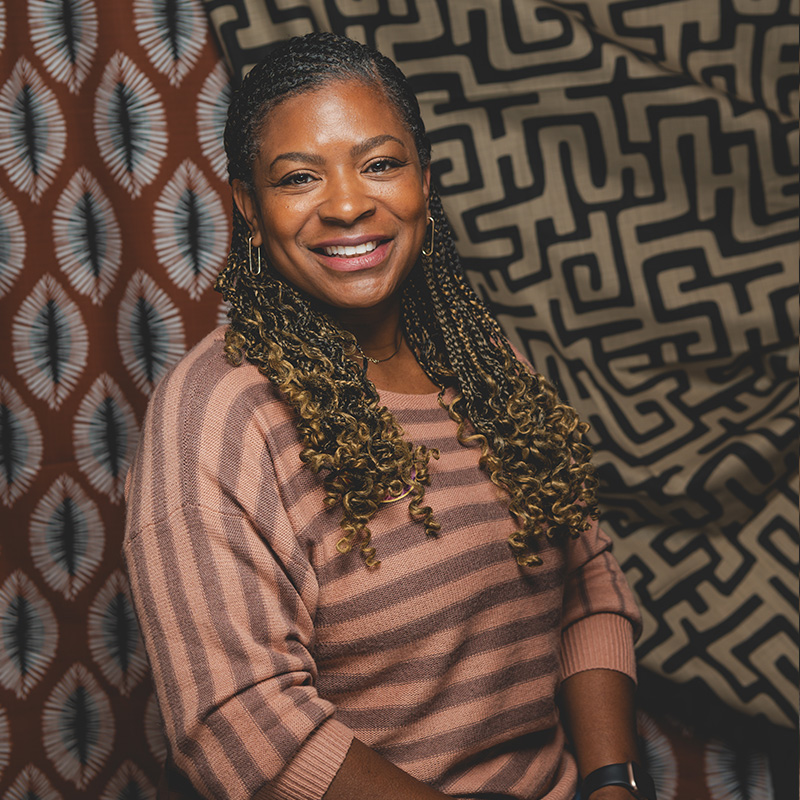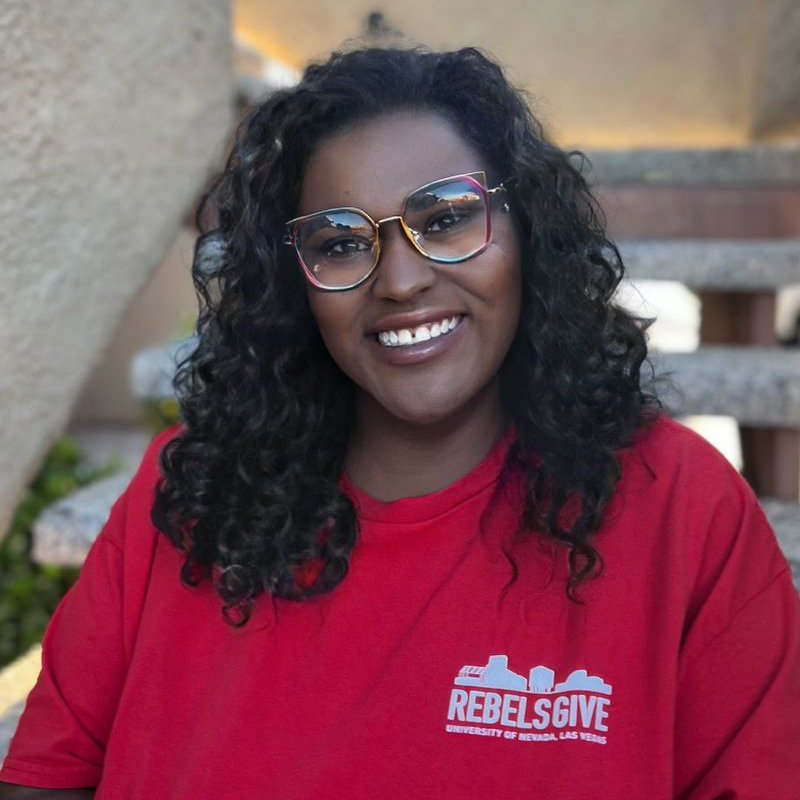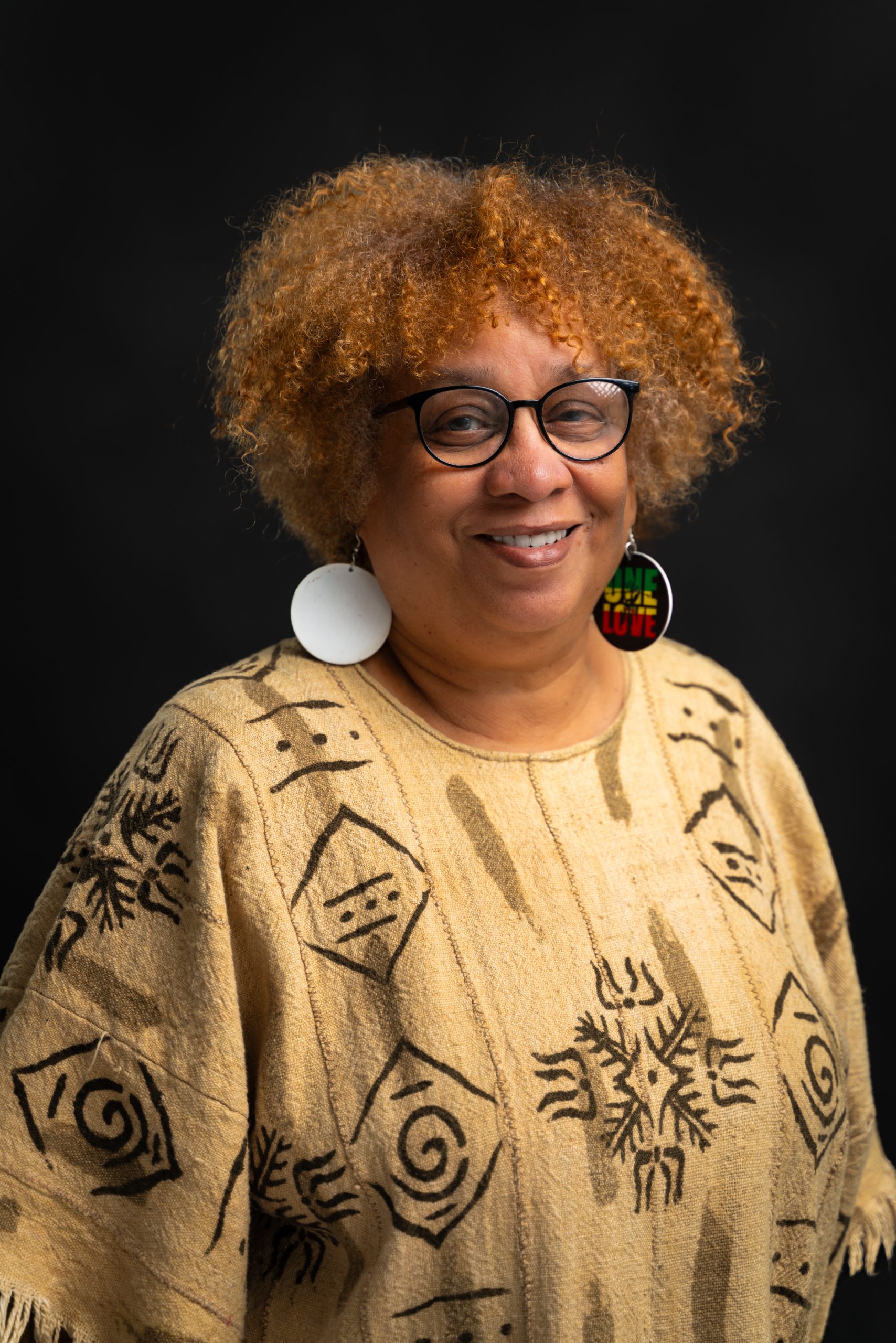
Chi T. Mathias
"I feel like because I got the help that I needed as a young mom in her 20s, what more can I do to make sure that I pay that forward? So not only my children, my grandchildren, but all the other mothers that are out there get that same support."
Chi T. Mathias
Ashby Combahee
Alright, well, my name is Ashby Combahee. I am here with Dartricia Rollins and we are interviewing Chi T. Yes. For the Telling Our Own Stories: Black Women’s Leadership Legacies event. So today is September 23rd, 2023. And Georgia Dusk: a southern liberation oral history is conducting this oral history at the 7 Stages Theatre in Little Five Points neighborhood of Atlanta. So you have been asked to participate in the storytelling project to uplift the stories of Black women and their lineage of radical leadership and part of the film screening of Storming Caesar’s Palace. Storming Caesar’s Palace uplifts the story of a band of ordinary Black mothers who launched one of the most extraordinary yet forgotten, feminist anti poverty movements in US history, providing a blueprint today for an equitable future. This oral history collection is in partnership with The GRO Fund, filmmaker Hazel Gurland-Pooler, Red Owl Partners, Tender Foundation, Black Feminist Futures, the Center for Civic Innovation Atlanta, Represent Georgia, and WRFG Atlanta. So with all of that. Chi T. Can you please introduce yourself by saying your name, your pronouns, and your age?
Chi R. Mathias
Hello, my name is Chi like the tea middle initial happens to be T. Mathias, I am she/her. I am 45, actually 44 years old, I’ll be 45 in December. I keep saying I’m 45. And I’m not yet.
Ashby Combahee
You’re aging yourself up. So to kind of ground us in this oral history, who do you dedicate this to?
Chi R. Mathias
My grandmother.
Ashby Combahee
What was her name?
Chi R. Mathias
Beatrice Small.
Chi R. Mathias
That’s a beautiful name.
Ashby Combahee
Okay, so where are you from Chi?
Chi R. Mathias
Originally from St. Louis, Missouri. I’ve been here in Georgia since 2002.
Ashby Combahee
What inspired to move here?
Chi R. Mathias
I was married at the time, to the father of my children. He moved here for his family, his family was in Georgia, and he got the support that he needed from his family. So we transitioned here. And even though the marriage didn’t last, I decided to stay here and raise my children here as a single mom. So yeah.
Ashby Combahee
And so who are the key people in your life? And what are the values that they instilled in you?
Chi R. Mathias
Yeah, well, I want to say my daughters, even though they’re a younger generation. Leaving the marriage because of abuse I did for my daughters. Persevering through the challenges that domestic violence and poverty leave you with. I did that for my girls. And so they have created such a resilience on the inside of me to this day. And everything I do is to be able to leave a legacy not only for them, but also now for my grandson. So they’re the ones that are the reason that I’m still I’m still going strong.
Ashby Combahee
And so you know, you mentioned a good bit of your experiences as a single Black mother and your transition with poverty. And so I’m curious, how did your family growing up provide for you? And also, what right now is your relationship with the welfare system.
Chi R. Mathias
So growing up, my mother was murdered when I was 13 years old. And as a result of losing my mother at a young age, my grandmother became my caregiver. And so I was a ward of the court didn’t have to go through formal adoption because it was a family member. And so she provided for me early on, I didn’t really get into the welfare system until I became a single mother. After the divorce after the separation and divorce, then that was when I really had to lean heavily, not only on legal aid for the divorce, that was the first one. And then of course, you know, welfare to be able to feed them, which they always ate some assistance with, you know, the domestic violence transitional housing that I had to go through. So I also had support in transitional housing, because I was coming out of a domestic violence situation. So all of that was very supportive through that process. Now, today, me 44, my daughters are grown, college graduates, I have a grandson now, so I’m not depending on the system anymore. But I feel like it helped me to, to make sure that they were okay. Right, that they were well. And now on the other side of it as an adult. I am a domestic violence advocate now, right. I am a doula. So I help moms who are pregnant, birth, both in their birthing as well as in their postpartum service, and provide free resources and support for those moms and looking for other resources for mothers who can’t afford doula services. And that’s a big thing. Especially in the state of Georgia, that every Black woman get the resources that she needs to birth in a very dignified and safe way. And so I feel like because I got the help that I needed as a as a young mom in her 20s, what more can I do to make sure that I pay that forward? So not only my children, my grandchildren, but all the other mothers that are out there, they need that same support.
Ashby Combahee
And I’d love to hear just a little bit more about that work. Yeah, how are you doing it? And I’m wondering, who are you doing it in partnership with?
Chi R. Mathias
I haven’t established any solid partnerships. And that’s part of the reason why I’m here today to figure out who I can partner with. I’ve been given a lot of resources, in terms of who to partner with as a Black woman as a Black doula. But I haven’t been able to really officially connect with them. And so unfortunately, most of my customer base is coming from another community that doesn’t look like me because they can afford it. They say it’s a luxury but I don’t think it needs to be a luxury service. I believe that every Black woman should have a doula and I know that Medicaid is supposed to be reimbursing doulas. So trying to figure out what that looks like trying to find out, you know what other funding options are out there that are funding doulas to support women who can’t afford it. So I’m open to learning. I’m open to growing I’ve invested in the certifications. Now it’s time to do the work, right. But I love it absolutely love this work. And I can’t imagine doing anything else. But being the wing woman for an expecting family. Yeah.
Ashby Combahee
And so one of the questions, the last question that I’ll formally ask, it’s kind of like, well, the future question, of course, reflecting on now, as well. What might guaranteed income or direct cash support mean, for you or your family or the community that you are with or work with?
Chi R. Mathias
So I’m an entrepreneur, right? So I don’t work a full time job. So, you know, having direct funds would allow me to continue to do what I need to do. I’m in a situation now where I need a car, right. And so if I have clients that need support, and service, I have to get there. So being able to have that solid income would make sure that I pay that car note every single month, right? So that I can continue to grow my doula practice, and support the families that need the support. So it would definitely help me even now, it definitely would, my daughter is actually supporting me. So because of what I instilled and put in her at a very young age, now she’s able to support me so that I can live out my dream, which is amazing.
Ashby Combahee
Anything else Chi that we didn’t touch on that you want to make sure you share on this recording?
Chi R. Mathias
No, I think that’s it, I really wanted to really talk about the doula work and the need for Black women to have doulas. That was the biggest thing and the resources that are needed in order to support them.
Ashby Combahee
I’m really happy. Yeah, you shared more about that. And it’s, it’s a vital resource for all families to have as they’re going through childbirth in particular. And something that we, Georgia Dusk have to talk with several birth workers about so I appreciate you for bringing that up.
Chi R. Mathias
Thank you so much. Thank you. Thank you.
Ashby Combahee
Anything else, Dartricia?
Dartricia Rollins
I am actually curious if you would talk more about, what, the impact of families having a doula and what what. Like it is important, and like what do you see the impact of a birthing people having having a doula receiving care from a doula like mean for their lives?
Chi R. Mathias
Well number one is empowerment, right. So Black women need to know they need to be empowered to whether they decide to birth at home, or in a hospital. So having that advocate, to support them at home to make sure that they’re carrying a baby full term, that they’re not experiencing preterm labor, which you know, if you don’t get the support you need, the likelihood of that increases. If you decide to birth in a hospital, right, making sure that you leave alive, making sure that your baby is healthy, being able to advocate for breastfeeding and to support that the breast milk is the for your baby’s first immune system shot, right? And making sure that your baby is healthy and thriving and lives to their first birthday. And so a lot of the mortality rate the morbidity rate that we see having a doula educates, empowers and supports Black women and so the more resources and funding we have to support them really to reimburse the doula a living wage. Right. That’s what we’re advocating for a living wage to be able to continue to offer the support. So that’s it.
Dartricia Rollins
Thank you.
Chi R. Mathias
You’re welcome.
Dartricia Rollins
I appreciate you. Yeah.
EXPLORE MORE STORIES
Bisa Welch

Matthew Mondschein

Venorica Tucker

